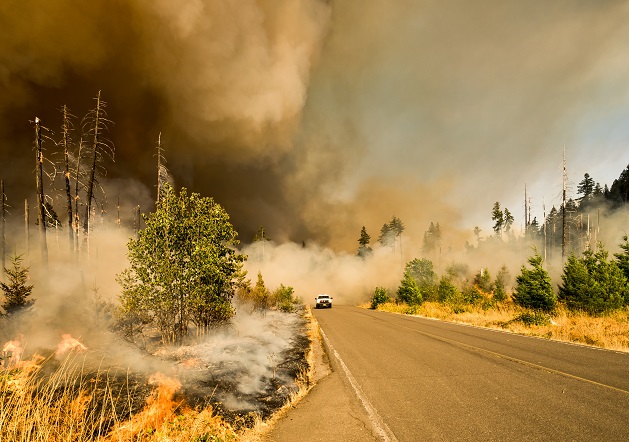Our generation must speak out for the poor and vulnerable, and the generations to come, and not act as if history ends with us.
 Photo: Marcus Kauffman (Unsplash, CC0)
Photo: Marcus Kauffman (Unsplash, CC0)
This year has been remarkable for the range and intensity of extreme weather patterns.
A heatwave in July affected much of the Northern hemisphere: fires killed 92 people in Greece; Japan suffered severe flooding then a deadly heatwave, with a total of 350 fatalities; wildfires in California have caused billions of dollars of damage; and nuclear power stations had to be switched off where river water became too warm to be used for cooling reactors. Dust storms in Northern India killed 125 people in May, while 450 died in monsoon flooding in Kerala in recent weeks. For once, high income countries seem to have suffered as many fatalities as poorer nations.
Meteorologists and climate scientists are still investigating the extent to which these events are caused by man-made climate change, but it’s clear that extreme weather patterns are becoming more common. 16 out of the 17 hottest years on record have been in this century, and multiple different studies show overall temperature trends rising on both land and sea.
Sir John Houghton, the Christian who first chaired the Intergovernmental Panel on Climate Change (IPCC), argued that responses to climate change should be two-fold: mitigation and adaptation. The Paris Climate Accord is an international framework for mitigating the effects of man-made climate change, by seeking to reduce greenhouse gas emissions such that global temperatures do not rise by more than 2oC above pre-industrial levels. However, this is a very long term project as reduced emissions will take decades to work through to changed temperatures. Adaptation, on the other hand, is about helping people respond practically to changes in climate already, so as to minimise the adverse effects of heatwaves, floods and drought. Together, the goal is living sustainability over multiple generations, on a planet with finite physical resources.
As I have reflected on this I have been reading Matthew 24-25, which is one long discourse about the end of the age and the signs of Jesus’ return. Many Christians try to analyse the timing and circumstances around the second coming, but the overall thrust of the passage is being watchful and prepared for the Master’s return – as ‘faithful and wise servants’ (24:45) who do what pleases God.
The book-ends of this discourse are pertinent. Jesus begins by warning that there will be wars and disasters – great earthquakes, famines and pestilences in various places, and fearful events and great signs from heaven (24:6-8). Yet the end will not come before the gospel of the kingdom is preached as a testimony to every nation (24:14). The discourse closes with Jesus explaining that when he does return, he will gather the nations and separate people like a shepherd divides the sheep and goats (25:31-46). The righteous are those who care for the hungry, the stranger, the sick and imprisoned. If we connect these book-ends, then the way we respond to those who are caught up in disasters can witness to God’s kingdom and will also be evidence of our own discipleship.
So what are the opportunities for faithful and wise discipleship in the context of climate change? Much has been written about personal responses – the many ways we can reduce the amount of energy we use directly and indirectly, by living more simply. At the church level, we can make contingency plans for responding with practical love and care to people who get caught up in extreme weather events, both locally and globally – for example by forging partnerships with churches in lower income countries. More ideas, both to mitigate and adapt, can be found at Operation Noah, Climate Stewards, the John Ray Initiative and A Rocha.
At the public policy level, governments must be persuaded to stick to the accountability set out in the Paris accord. Both USA and Australia have pulled back this year because of pressure from groups that bear the short term cost of reducing emissions. Our generation must speak out for the poor and vulnerable, and the generations to come, and not act as if history ends with us.
Jesus said we should learn to interpret the signs of the times. Could climate change be a sign that challenges the quality of our discipleship in a globalised world?
Jonathan Tame, Director of the Jubilee Centre (Cambridge, UK).
This article first appeared on the Jubilee Centre website and was republished with permission.

Las opiniones vertidas por nuestros colaboradores se realizan a nivel personal, pudiendo coincidir o no con la postura de la dirección de Protestante Digital.
Si quieres comentar o